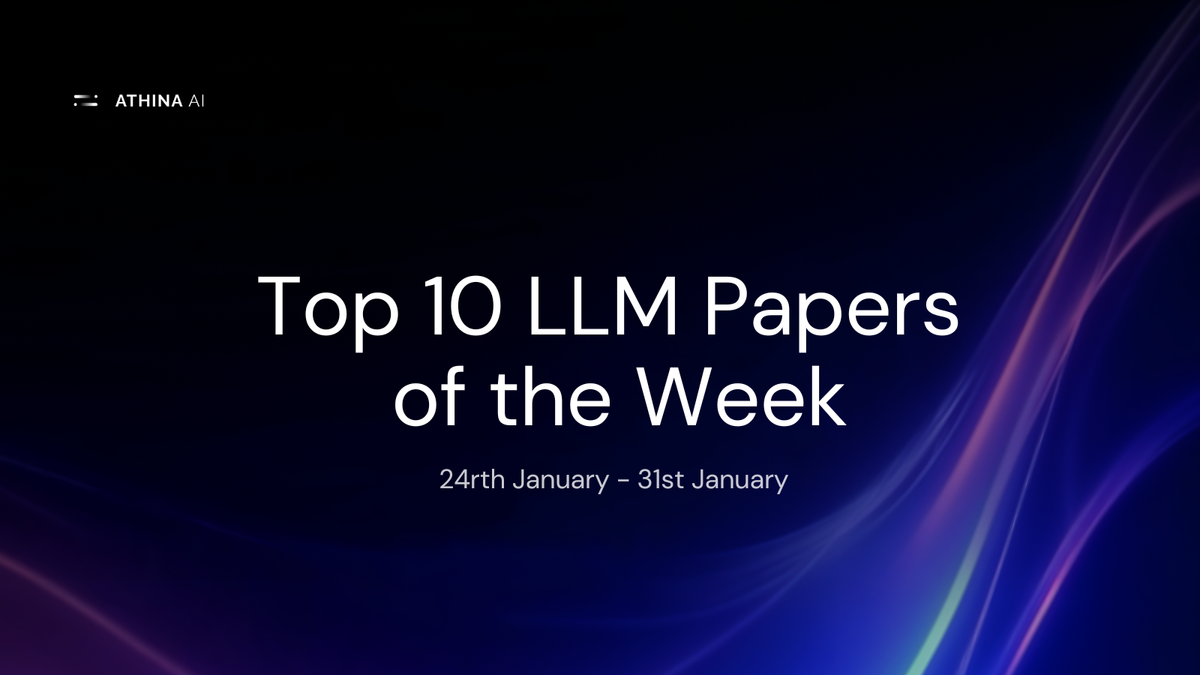Top 10 LLM Papers of the Week

As January comes to a close, the AI landscape is more dynamic than ever, with breakthroughs redefining what’s possible. DeepSeek has become a leading player in open-source AI, and the open-source community as a whole is growing rapidly, driving innovation faster than ever. In this article, we highlight Top 10 Cutting-Edge Research Papers on AI Agents, RAG and Benchmarking from last week, breaking down their insights, exploring their impact, and showcasing their role in shaping the next wave of AI advancements. Lets dive in.
1) Improving Retrieval-Augmented Generation through Multi-Agent Reinforcement Learning
Retrieval-augmented generation (RAG) pipelines typically optimize components like query rewriting and document retrieval separately, leading to misalignment in QA tasks. To address this, the authors propose MMOA-RAG, a multi-agent reinforcement learning approach that treats RAG components as cooperative agents working toward a unified reward. Experiments on QA datasets show that MMOA-RAG improves pipeline performance and surpasses existing baselines.
Why it Matters:
This approach enhances the coherence and effectiveness of RAG pipelines, leading to more accurate and reliable AI-generated answers in question-answering tasks.
2) IntellAgent: A Multi-Agent Framework for Evaluating Conversational AI Systems
Large Language Models (LLMs) are advancing in conversational AI, but evaluating their real-world performance remains challenging. The authors introduce IntellAgent, an open-source multi-agent framework that generates diverse, policy-driven benchmarks using graph modeling and user-agent simulations. Unlike traditional static evaluations, IntellAgent provides detailed diagnostics, identifies weaknesses, and supports flexible integration for improving AI systems.
Why it Matters:
IntellAgent enables more precise and dynamic evaluation of conversational AI, leading to smarter, more adaptable models that perform better in real-world applications.
3) Agent-as-Judge for Factual Summarization of Long Narratives
While LLMs perform well on summarization tasks using traditional metrics like ROUGE, these metrics fail to assess factual accuracy, especially in long narratives. The authors introduce Narrative Fact Score, an "Agent-as-a-Judge" framework that evaluates summaries using a Character Knowledge Graph (CKG) to check consistency and identify errors. Experiments show that it improves factual reliability compared to existing methods.
Why it Matters:
This approach enhances the accuracy of AI-generated summaries, ensuring they remain factually consistent, particularly for complex and lengthy narratives.
4) The Alternative Annotator Test for LLM-as-a-Judge: How to Statistically Justify Replacing Human Annotators with LLMs
The “LLM-as-a-Judge” approach uses Large Language Models (LLMs) as annotators in various fields, but there is no standard way to assess their reliability. The authors propose the Alternative Annotator Test (alt-test), a statistical method that determines when LLMs can replace human annotators using a small subset of labeled data. Experiments with multiple LLMs and prompting techniques show that closed-source models like GPT-4o often outperform open-source alternatives.
Why it Matters:
This work establishes a more rigorous way to evaluate LLM annotations, promoting reliable AI-driven assessments across research fields.
5) MultiChallenge: A Realistic Multi-Turn Conversation Evaluation Benchmark Challenging to Frontier LLMs
MultiChallenge is a new benchmark designed to evaluate LLMs in multi-turn conversations, highlighting four key challenge areas that current models struggle with. These challenges require precise instruction-following, context management, and reasoning. Despite high scores on existing benchmarks, top models like Claude 3.5 Sonnet (June 2024) achieve only 41.4% accuracy on MultiChallenge, demonstrating significant gaps in performance.
Why it Matters:
This benchmark reveals critical weaknesses in LLMs' conversational abilities, driving improvements for more reliable and context-aware AI interactions.
6) Agent-R: Training Language Model Agents to Reflect via Iterative Self-Training
Agent-R is a self-training framework that enhances LLM agents by enabling real-time self-reflection and error correction. Using Monte Carlo Tree Search (MCTS), which simulates multiple future outcomes to find the best action, Agent-R dynamically constructs training samples to recover from errors. By splicing incorrect and correct paths, it improves learning efficiency and scalability. Experiments show that Agent-R significantly enhances agent performance in interactive environments, outperforming baselines by 5.59%.
Why it Matters:
This approach allows AI agents to learn from their own mistakes in real-time, making them more reliable and adaptable in complex, interactive tasks.
7) HateBench: Benchmarking Hate Speech Detectors on LLM-Generated Content and Hate Campaigns
Hate Bench is a benchmarking framework that evaluates hate speech detectors against LLM-generated hate speech. The authors create a dataset of 7,838 samples from six LLMs and test eight detectors, revealing that their effectiveness declines with newer LLM versions. They also highlight the risk of automated LLM-driven hate campaigns, showing that adversarial and model-stealing attacks can bypass detection with a 96.6% success rate.
Why it Matters:
This study exposes vulnerabilities in hate speech detection systems, urging researchers and platforms to strengthen defenses against evolving AI-generated threats.
8) MDEval: Evaluating and Enhancing Markdown Awareness in Large Language Models
MDEval is a benchmarking framework designed to assess Markdown Awareness in LLM-generated responses, which impacts readability in web chatbots. It introduces a dataset of 20K instances across 10 subjects in English and Chinese, combining generation tasks with statistical methods for better interpretability. MDEval achieves high correlation (0.791) and accuracy (84.1%) with human evaluations and enables fine-tuned open-source models to match GPT-4o in Markdown structuring.
Why it Matters:
This benchmark improves the structured readability of LLM outputs, making chatbot responses clearer and more user-friendly across different models.
9) CFT-RAG: An Entity Tree Based Retrieval Augmented Generation Algorithm With Cuckoo Filter
Tree-RAG enhances retrieval-augmented generation (RAG) by structuring knowledge hierarchically but suffers from efficiency bottlenecks. This paper introduces an acceleration method using an improved Cuckoo Filter, which optimizes entity localization for faster retrieval. The Cuckoo Filter enables rapid membership queries and dynamic updates, making retrieval significantly more efficient. Experiments show that the proposed method is hundreds of times faster than naive Tree-RAG while maintaining high generative quality.
Why it Matters:
This optimization drastically improves the speed of knowledge retrieval in RAG systems, making AI-powered generation more scalable and efficient for large datasets.
10) Parametric Retrieval Augmented Generation (RAG)
Existing RAG methods improve LLM reliability by injecting retrieved documents into the input, but this increases computational costs and limits deep knowledge integration. This paper proposes Parametric RAG, which embeds external knowledge directly into the model’s feed-forward network (FFN) parameters. This approach reduces processing overhead while enhancing knowledge retention. Experiments show that Parametric RAG improves efficiency and accuracy and can complement in-context RAG for even better performance.
Why it Matters:
Parametric RAG enables LLMs to store and use external knowledge more effectively, making AI responses faster, more reliable, and better suited for complex reasoning tasks.
Conclusion
As January draws to a close, this week’s featured papers showcase groundbreaking advancements in AI Agents, LLM Benchmarking, and Retrieval-Augmented Generation (RAG). From optimizing multi-agent collaboration to improving evaluation frameworks and accelerating real-time retrieval, these studies push AI toward greater efficiency, accuracy, and adaptability. As research continues to evolve, these innovations will play a crucial role in shaping the next generation of AI systems.
For insights from the Top 10 Papers from the Past Two Weeks, click here.
Looking to streamline your AI development? Explore Athina AI — the ideal platform for building, testing, and monitoring AI features tailored to your needs.



